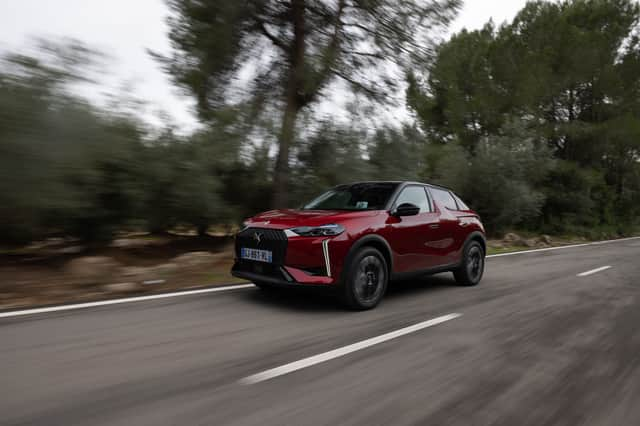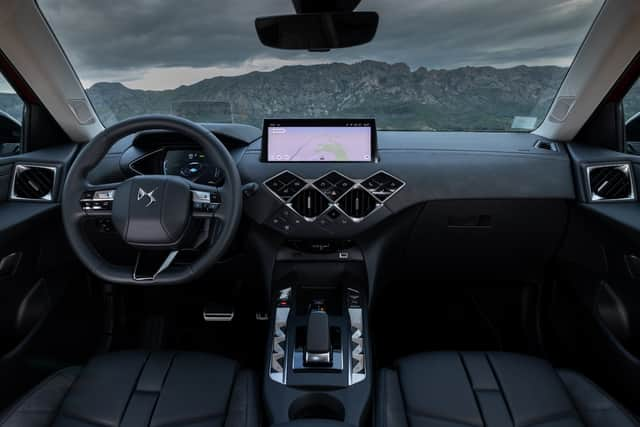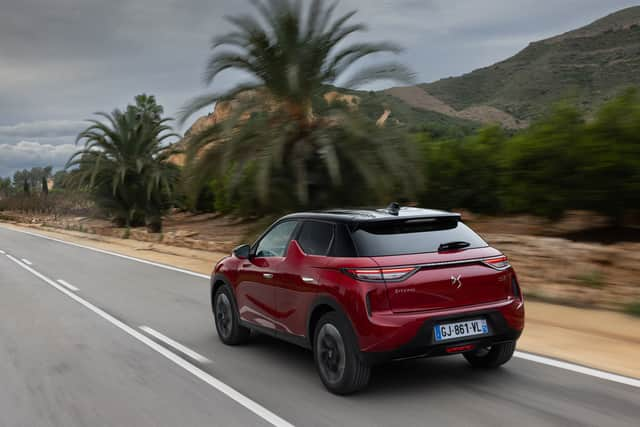DS 3 E-Tense review: Premium but pricey EV keeps moving upmarket


DS hasn’t had an easy time in the UK. Its association with the less-than-premium Citroen and an initial range of cars that failed to inspire much interest have left it struggling to be recognised as a true premium brand.
But it’s on a major march to change that with its current line-up. 2021 saw the impressive new DS 4 and DS 9 arrive, in 2021 the DS7 underwent a major update and now it’s the turn of the marque’s smallest model - the DS 3.
Advertisement
Hide AdAdvertisement
Hide AdDropping the Crossback from the outgoing car’s name, this is a midlife update rather than an all-new model but it does bring touches designed to further establish DS as a contender at the higher end of the market. Styling and equipment upgrades are enhanced by an all-new all-electric drivetrain in the E-Tense variant which brings more power and range.
The external update includes new-look headlights and wide-set vertical running lights - all of them LED - plus a new grille and associated aero features. According to DS, chrome is falling out of fashion, so the new DS 3 has undergone a “chrome detox”. There’s now a black finish to the wider grille, with smaller metallic highlights on Rivoli and Opera trim, while the rear badging has a subtler stainless steel finish. Like the larger DS 4, there’s a strange upward kink at the B pillar which definitely adds something to the design but also causes visibility problems for the driver.
The facelift has also brought a step up in interior materials, with the aim of adding a higher quality finish to even the entry level trim. Those lower-spec cars get Alcantara upholstery as standard but we tested the two higher trims - Rivoli and Opera - where there is a truly premium look and feel. Interesting textures on the dash and doors are complimented by high-end leather upholstery, with the Opera’s watch strap finish particularly eye-catching.
As in its other models, DS has fully committed to the diamond styling motif, from the air vents and instrument surround to the five diamond shapes that house various buttons beneath the touchscreen. It’s bold and attractive but the buttons are a little fiddly to use and too easy to press when trying to use the new 10.3-inch touchscreen.
Advertisement
Hide AdAdvertisement
Hide AdFor those in the front it’s a pleasant and impressive place to be but the whole car feels built around those two seats, with the rear almost an afterthought. There’s virtually no legroom and the door tops follow the exterior kink and cut out light, creating a cramped feeling. Even the cupholders - set almost horizontally in the doors - suggest you’re not really expected to use the back seats.
DS say there’s no difference in interior or boot space between the ICE and EV models and all versions of the DS 3 get a 350-litre boot that feels adequate but is blighted by a high lip.


The DS 3 E-Tense is one of the first models to get the improved battery and motor setup from parent company Stellantis (it’s also in the updated Vauxhall Mokka-e and the European Car of the Year winner the Jeep Avenger). It’s around 15% more powerful than the DS 3 Crossback E-Tense and the 54kWh battery offers an extra 45 miles or so of range without an increase in charging time.
Without a doubt it feels like the version to have, offering the quiet and smooth progress you associate with a premium brand. The 154bhp motor lacks the immediate urgency common to a lot of EVs but is very refined. Its more relaxed approach to making progress feels well suited to the car’s impeccable ride quality but slightly wobbly body control, which doesn’t encourage spirited driving anyway.
Advertisement
Hide AdAdvertisement
Hide AdThe E-Tense’s official range is 250 miles and early impressions are that that’s actually pretty realistic. Our car returned an impressive 4.1m/kWh over a mix of city, motorway and mountain roads and looked on-target for around 250 miles with the temperature in the mid-teens.
Compared to that smooth setup, the PureTech petrol feels out of place. It’s a decent engine but not refined enough for a truly premium car and lacking in punch - a feeling not helped by the ponderous automatic gearbox.
The PureTech’s ride also seems to suffer compared with the electric version. While the E-Tense’s comfort is exceptional for a small SUV, the lighter Puretech feels a little more jittery. The petrol’s main appeal is that it’s around £9,000 cheaper than the electric version.
DS 3 prices start at £25,900 for the entry level Performance Line with a 99bhp petrol engine, rising to £28,500 for the PureTech 130 and £37,145 for the E-Tense. All other trim levels only offer the 130 or E-Tense motors, with the top-spec Opera E-Tense reaching £42,700 before options. Whichever way you cut it, that’s a lot of money for a small electric urban runaround.
Advertisement
Hide AdAdvertisement
Hide AdAll cars get full LED lights, the 10.3-inch infotainment system with Android Auto and Apple CarPlay, digital instruments and rear parking sensors. At the top end, Opera has Nappa leather, heated massage seats, a head-up display and reversing camera, plus extra driver assistance features. It’s a decent spec but similar money spent on something like the Kia Niro will get you more space, more range and more kit, but a less high-end feel.
In many ways the DS 3 is a very likeable small car. It’s chic, refined and comfortable, with a good EV range. However, it is very small, even among compact SUVs, and the electric version is not cheap while the petrol engine lacks the necessary refinement.


DS 3 E-Tense Opera
Price: £42,700; Motor: Single synchronous electric motor; Battery: 54kWh; Power: 154bhp; Torque: 192lb ft; Transmission: Single-speed automatic, front-wheel-drive; Top speed: 93mph; 0-62mph: 9 seconds; Range: 250 miles; Consumption: 3.8-4.4m/kWh; Charging: up to 100kW
Comment Guidelines
National World encourages reader discussion on our stories. User feedback, insights and back-and-forth exchanges add a rich layer of context to reporting. Please review our Community Guidelines before commenting.
